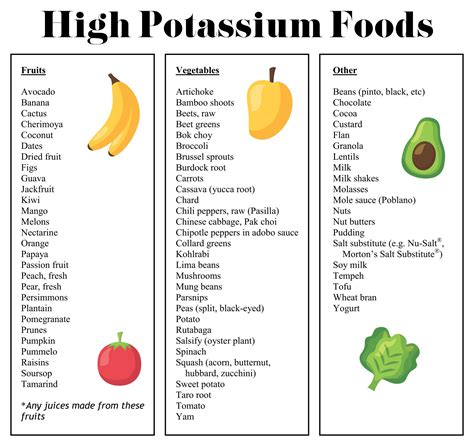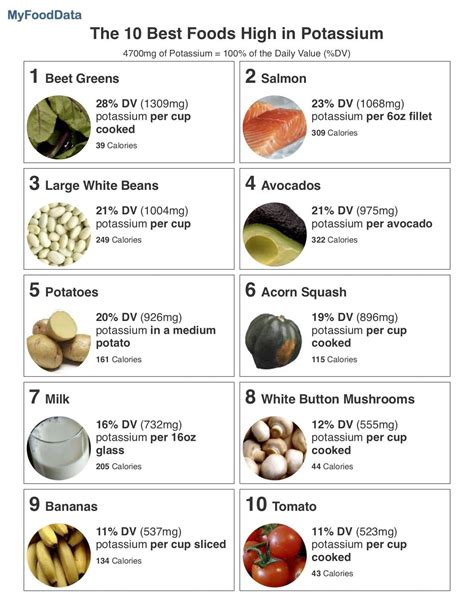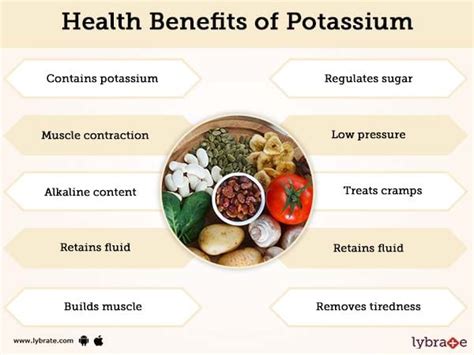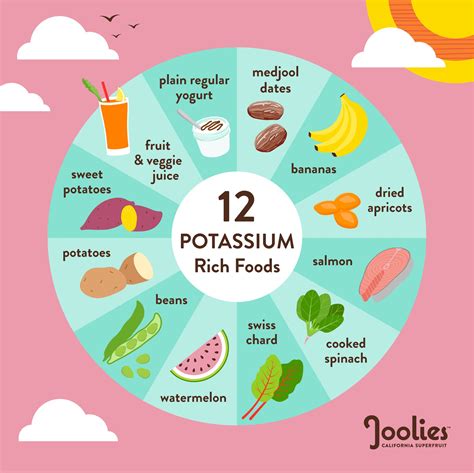Intro
Discover 7 high potassium foods, including bananas, spinach, and avocados, to boost heart health, lower blood pressure, and support muscle function with essential electrolytes and nutrients.
Maintaining a balanced diet is crucial for overall health and well-being. One of the key components of a healthy diet is ensuring adequate intake of essential nutrients, including vitamins, minerals, and electrolytes. Among these, potassium, often abbreviated as K, plays a vital role in various bodily functions, including muscle and nerve function, heart health, and maintaining a healthy blood pressure. Foods high in potassium are essential for individuals looking to manage or prevent conditions related to potassium deficiency, such as hypokalemia. Incorporating high potassium foods into your diet can have numerous health benefits, from reducing blood pressure to supporting bone health.
The importance of potassium in our diet cannot be overstated. It is an electrolyte that helps in conducting electrical impulses throughout the body, necessary for the functioning of muscles and nerves. Potassium also helps in balancing the effects of sodium, thereby aiding in maintaining healthy blood pressure levels. Furthermore, it supports the healthy functioning of the heart and reduces the risk of kidney stones. Despite its importance, many people do not consume enough potassium-rich foods, leading to a deficiency. This deficiency can manifest in various symptoms, including muscle weakness, fatigue, and heart palpitations.
Incorporating high potassium foods into your diet is relatively straightforward, given the wide variety of potassium-rich foods available. These foods range from fruits and vegetables to dairy products and lean proteins. Understanding which foods are high in potassium can help individuals make informed dietary choices, ensuring they meet their daily potassium needs. The recommended daily intake of potassium varies by age and other factors, but generally, adults are advised to consume at least 4,700 milligrams of potassium per day. With the right dietary choices, it is possible to achieve this goal and reap the numerous health benefits associated with adequate potassium intake.
Introduction to High Potassium Foods

High potassium foods are diverse and can be easily incorporated into daily meals. These foods not only provide potassium but also a range of other essential nutrients. For instance, leafy greens like spinach are rich in vitamins A and K, while fruits like bananas are good sources of vitamin C and fiber. Including a variety of these foods in your diet can help ensure you are getting all the necessary nutrients for optimal health. Moreover, high potassium foods can be consumed in various forms, including fresh, frozen, or dried, making them accessible throughout the year.
Benefits of High Potassium Foods
The benefits of consuming high potassium foods are numerous. Potassium helps in maintaining fluid balance, supporting healthy blood pressure, and promoting bone health. It also aids in muscle recovery after exercise, reducing muscle cramps and spasms. Furthermore, potassium can help mitigate the effects of sodium in the body, which is beneficial for individuals with high blood pressure or those at risk of developing kidney disease. The role of potassium in supporting overall health underscores the importance of including potassium-rich foods in one's diet.Top High Potassium Foods

Among the top high potassium foods are:
- Leafy greens like spinach and kale
- Fruits such as bananas, apricots, and avocados
- Legumes, including white beans and lentils
- Nuts and seeds, such as almonds and pumpkin seeds
- Fish, particularly salmon and tuna
- Dairy products, like milk and yogurt
These foods are not only rich in potassium but also provide a range of other nutrients, making them excellent additions to a healthy diet. For example, spinach is rich in iron, while bananas are a good source of vitamin B6. Incorporating these foods into meals and snacks can help individuals meet their daily potassium needs and support overall health and well-being.
Incorporating High Potassium Foods into Your Diet
Incorporating high potassium foods into your diet can be straightforward. Here are some tips: - Start your day with a potassium-rich breakfast, such as oatmeal with banana and almond milk. - Include leafy greens in your salads or sauté them as a side dish. - Snack on fruits and nuts throughout the day. - Use herbs and spices to add flavor to your meals instead of salt, which can help reduce sodium intake and make room for more potassium-rich seasonings.Health Benefits of Potassium

The health benefits of potassium are well-documented. Potassium helps in lowering blood pressure, reducing the risk of heart disease, and supporting bone health. It also aids in reducing the risk of kidney stones and supports healthy muscle and nerve function. Furthermore, potassium can help in managing conditions such as hypokalemia, a condition characterized by low potassium levels in the blood. The benefits of potassium highlight the importance of consuming foods rich in this essential mineral.
Potassium Deficiency and Its Symptoms
A potassium deficiency, or hypokalemia, can lead to a range of symptoms, including muscle weakness, fatigue, and heart palpitations. In severe cases, it can lead to muscle cramps, constipation, and respiratory problems. A deficiency in potassium can be caused by a lack of potassium-rich foods in the diet, certain medications, or underlying health conditions. Understanding the symptoms of potassium deficiency can help individuals seek medical attention if necessary and make informed dietary choices to prevent or manage the condition.Potassium-Rich Foods for Specific Health Needs

Different individuals may have specific health needs that can be supported by consuming potassium-rich foods. For example:
- Athletes may benefit from consuming bananas or dates before and after exercise to support muscle function and recovery.
- Individuals with high blood pressure may find that consuming foods like spinach, sweet potatoes, and avocados helps in managing their condition.
- Pregnant women can benefit from potassium-rich foods like leafy greens and beans to support their overall health and the development of their baby.
Practical Tips for Increasing Potassium Intake
Increasing potassium intake can be achieved through simple dietary changes. Here are some practical tips: - Keep a bowl of potassium-rich fruits like bananas and apples on the counter for easy snacking. - Incorporate potassium-rich vegetables into your meals, such as adding spinach to your omelets or smoothies. - Use potassium-rich ingredients in your cooking, such as using vegetable broth instead of water.Conclusion and Future Directions

In conclusion, incorporating high potassium foods into your diet is a simple yet effective way to support overall health and well-being. With the wide variety of potassium-rich foods available, individuals can easily meet their daily potassium needs. Whether you are looking to manage a specific health condition or simply support your overall health, high potassium foods are an excellent choice. As research continues to uncover the benefits of potassium, it is clear that this essential mineral will remain a crucial component of a healthy diet.
Final Thoughts
As we move forward, it is essential to prioritize potassium-rich foods in our diets. By doing so, we can reap the numerous health benefits associated with adequate potassium intake, from supporting heart health to aiding in muscle recovery. Remember, a balanced diet that includes a variety of whole foods can provide all the necessary nutrients for optimal health. Make informed dietary choices today and support your body's needs with high potassium foods.What are the symptoms of potassium deficiency?
+Potassium deficiency, or hypokalemia, can lead to symptoms such as muscle weakness, fatigue, and heart palpitations. In severe cases, it can cause muscle cramps, constipation, and respiratory problems.
How can I increase my potassium intake?
+You can increase your potassium intake by consuming potassium-rich foods such as bananas, leafy greens, and avocados. Incorporating these foods into your meals and snacks can help you meet your daily potassium needs.
What are the health benefits of potassium?
+Potassium has numerous health benefits, including lowering blood pressure, reducing the risk of heart disease, and supporting bone health. It also aids in reducing the risk of kidney stones and supports healthy muscle and nerve function.
We hope this article has provided you with valuable insights into the importance of high potassium foods and how they can support your overall health and well-being. If you have any further questions or would like to share your experiences with incorporating high potassium foods into your diet, please do not hesitate to comment below. Sharing this article with others can also help spread awareness about the benefits of potassium and encourage healthy dietary choices. Thank you for reading, and we look forward to your feedback!
